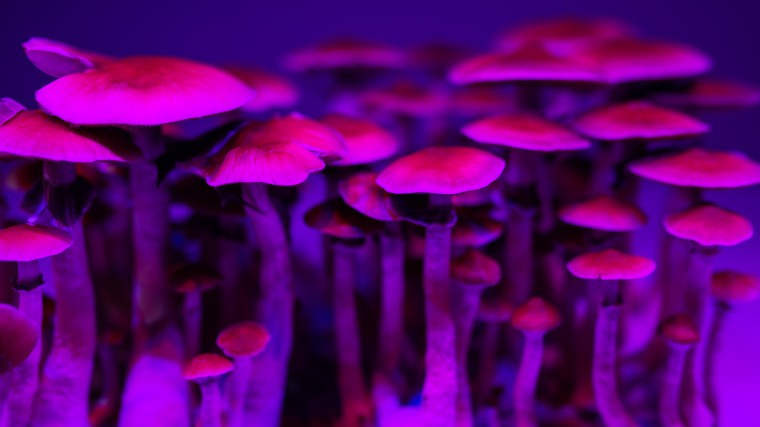I didn’t always think of psychedelics as medicine with the potential to help people work through mental health issues and addiction.
I grew up in D.A.R.E.-era suburban New Jersey as the so-called war on drugs was in full swing. That term was coined in 1971 under President Richard Nixon, and he, along with subsequent administrations — notably the Reagan administration — helped develop our current system of racist drug criminalization and mass incarceration. Like most Americans, I grew up hearing the constant refrain that all drugs were inherently bad, that we had to “just say no,” and that drug use would (and should) be punished.
But I'm now an adult and a policymaker instead of a credulous child and, looking at the research, three things are crystal clear. One is that criminalizing drug use does not make anyone safer. Two is that this country's failed war on drugs is a primary reason that people from our communities of color are disproportionately incarcerated.
And three is that psychedelics are a promising tool in our fight to improve treatment for mental health and addiction.
We are only now truly beginning the decadeslong process of unlearning our nation’s anti-science, fear-mongering approach to drugs.
It’s long past time to move beyond our outdated and racist war on drugs-era laws, and embrace humane and science-based drug policy. That’s why I have authored legislation, Senate Bill 519, to decriminalize psychedelics in California. My bill would allow any person in California over the age of 21 to use or share (without compensation) psilocybin (i.e., "shrooms"), dimethyltryptamine (DMT), ibogaine, mescaline (except when derived from peyote), LSD, ketamine and MDMA, and it would create an advisory panel to look into research projects on these substances. It recently passed the relevant Senate policy committees, cleared its appropriations review and is headed to the floor of the California state Senate — where I'm cautiously optimistic it could pass.
This has been a long time coming.
In 1965, the U.S. banned the sale and possession of psychedelic drugs and then, in 1970, drug scheduling — a classification system that ranked drugs based on their supposed potential for abuse and alleged lack of medical benefit — became law. Marijuana, psilocybin, MDMA and LSD were then classified and remain classified as Schedule I drugs, the most serious classification. Their status indicates by law that they have no determined medical value — a laughable claim in 2021 — which deliberately makes it very difficult for scientists to even get permission to even study these substances.
Psychedelics are a promising tool in our fight to improve treatment for mental health and addiction.
Despite those hurdles, limited but important studies have nonetheless been conducted and we know that substances such as MDMA, mushrooms and LSD are not only nonaddictive, but that they also appear to have significant medical benefits when used appropriately.
An increasing number of scientific studies show that psychedelics hold vast promise in treating mental health conditions such as post-traumatic stress disorder, anxiety, depression and substance use disorders. They also show great promise in treating substance use disorders, flipping the supposed conventional wisdom about psychedelics on its head.
That's why advocacy groups made up of veterans who have used psychedelics to heal from PTSD are pushing for decriminalization. It's why palliative care providers are seeing incredible benefits when cancer patients and others struggling with terminal diagnoses undergo psychedelic therapy. And it's why sexual assault survivors are using psychedelic treatment to work through trauma.
Given the health benefits of these substances and the very low likelihood of addiction, we should act now to begin to change drug policies across the country.
And yet, the federal government continues to insist that these substances are "Schedule I" — that they are both addictive and have no medical value — despite the growing body of evidence to the contrary. (It's not the first time they've done so.)
We are only now truly beginning the decadeslong process of unlearning our nation’s anti-science, fear-mongering approach to drugs. With drug overdose deaths and mental health issues at an all-time high — exacerbated by the increased social isolation and financial distress from Covid-19 — clearly it is time for a change.
The attitude that drugs should be criminalized and that psychedelics are fundamentally bad has held sway in policy circles for decades. But we’re starting to see a major shift. Cannabis, of course, has been decriminalized or legalized in many states, including California. There’s a growing consensus around the country that treatment, rather than incarceration, is a better way to address drug use and, where applicable, addiction.
And in 2020, Oregon became the first state to decriminalize all drugs, as well as approve the use of psilocybin in therapeutic settings. Washington, D.C., then decriminalized psilocybin, followed by Oakland and Santa Cruz here in California, among other cities.
I’m a firm believer that we need to move toward full, federal drug descheduling and decriminalization — and we can start to get there nationally by pushing forward in California, following the lead of Oregon. Decriminalizing psychedelics is one important step in that direction. Given the health benefits of these substances and the very low likelihood of addiction, we should act now to begin to change drug policies across the country.
We need to rethink our approach to drugs in America. In California, we started that journey with cannabis. Let’s make psychedelics the next step.




